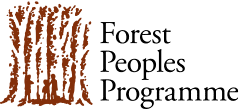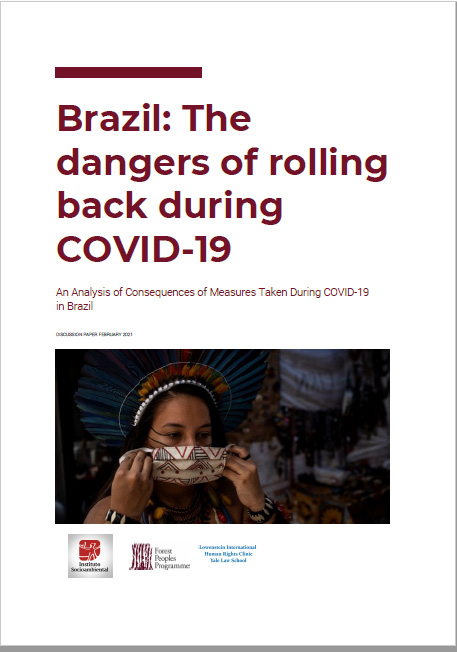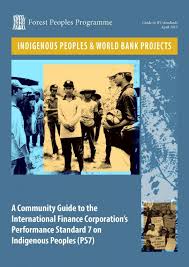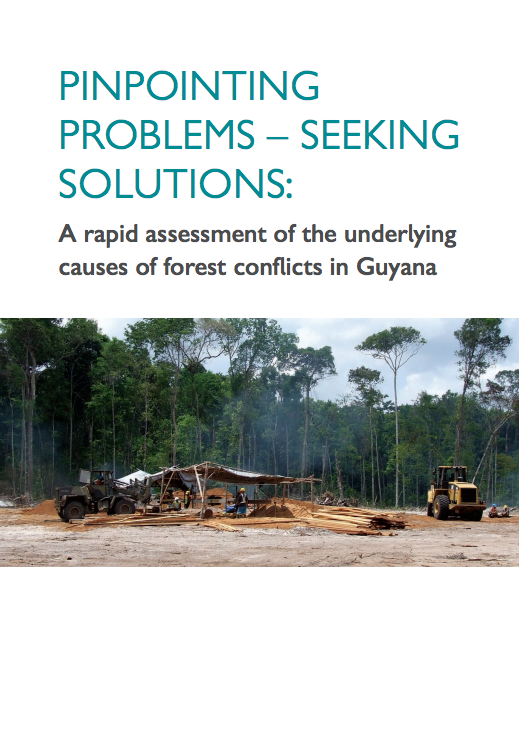Focal point
Location
Mission
Forest Peoples Programme supports the rights of peoples who live in forests and depend on them for their livelihoods. We work to create political space for forest peoples to secure rights, control their lands and decide their own futures.
Goals
- Get the rights and interests of forest peoples recognised in laws, policies and programmes
- Support forest peoples to build their own capacities to claim and exercise their human rights
- Counter top-down policies and projects that threaten the rights of forest peoples
- Promote community-based sustainable forest management
- Ensure equity, counter discrimination and promote gender justice
- Inform NGO actions on forests in line with forest peoples’ visions
- Link up indigenous and forest peoples’ movements at the regional and international levels
Resources
Displaying 16 - 20 of 53Indonesia: Rollback in the Time of COVID-19
This paper highlights the ways that the COVID-19 pandemic has affected and disenfranchised indigenous peoples and forest communities in Indonesia. The lack of adequate protection of the rights of indigenous peoples and their territories before the pandemic has been made worse by a lack of protection during the pandemic. The challenges faced by forest communities during the pandemic show that access to land and natural resources is crucial for the survival of communities whose livelihoods depend on the forest.
Brazil: The dangers of rolling back during COVID-19
Over the last several years, the Brazilian government has rolled back environmental and social protections, threatening ecosystems such as the Amazon rainforest and the livelihoods of indigenous peoples and traditional communities. The dismantling of inspection and protection programmes in indigenous territories coupled with political neglect towards the formal demarcation of indigenous lands or the strengthening of public policies to safeguard traditional ways of life has led to social, physical and cultural vulnerability for indigenous peoples.
Brasil: os perigos de reverter as salvaguardas ambientais e sociais para os direitos dos povos indígenas e das florestas durante a COVID-19
Nos últimos anos, o governo brasileiro reverteu as proteções ambientais e sociais, ameaçando ecossistemas como a floresta amazônica e a subsistência de povos indígenas e comunidades tradicionais. O desmantelamento dos programas de fiscalização e proteção em territórios indígenas, aliado ao descaso político com a demarcação formal das terras indígenas ou o fortalecimento das políticas públicas de salvaguarda dos modos de vida tradicionais, tem gerado vulnerabilidade social, física e cultural para os povos indígenas.
A Community Guide to the International Finance Corporation’s Performance Standard 7 on Indigenous Peoples (PS7)
This guide helps communities, community-based organisations and other supporters know what to do if a company is planning to develop projects on or near their customary lands, using a loan from the International Finance Corporation (IFC) – the private sector part of the World Bank Group. This guide is also useful for any projects using loans from other funders or companies that have chosen to follow the IFC’s social and environmental rules.
Pinpointing problems – seeking solutions: A rapid assessment of the underlying causes of forest conflicts in Guyana
Based on the experiences of Amerindian communities in Guyana, this briefing presents some of the main causes of forest conflicts in the country as well as recommendations for how to address these. In particular, the document presents the following points:
• Lack of full recognition of indigenous peoples’ land rights in line with international law, absence of effective FPIC procedures and limited transparency in forest governance are key underlying causes of forest-related conflicts in Guyana;






